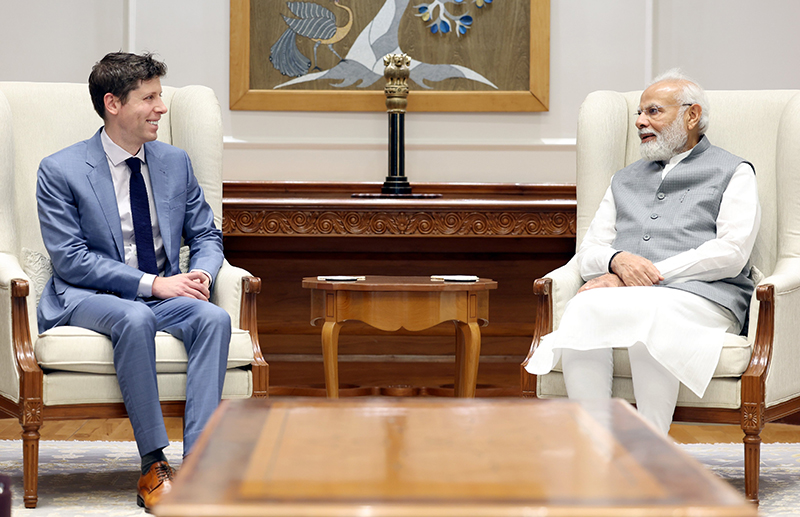 Open AI
Open AI
OpenAI CEO Sam Altman meets Indian Prime Minister Narendra Modi to discuss AI's role in India's digital transformation
OpenAI CEO Sam Altman recently met with Indian Prime Minister Narendra Modi in New Delhi. The meeting coincided with three crucial developments: India's chairmanship of the Global Partnership on AI (GPAI), the drafting of AI regulations through the Digital India Bill, and the country's push for conversational AI tools in administrative tasks.
During the meeting, Altman praised India's efforts in technological advancements such as UPI, Aadhaar, and the India stack. He highlighted the importance of coherent discussions and global regulation for AI, emphasizing safety and security as critical aspects, reported Modern Diplomacy.
Altman also noted the need to consider AI as part of a holistic technology ecosystem, touching on AI's implications in cybersecurity, open source, and space.
India's unique strengths in AI technologies were highlighted, with Indian companies ranking second in AI adoption in the Asia Pacific region. AI-powered tools are enhancing performance in sectors like education, healthcare, agriculture, and governance.
The country's thriving startup ecosystem boasts numerous unicorns deploying AI in their core services.
India's Ministry of Electronics and IT (MeitY) has launched initiatives like the Bhashini program to enable easy access to the internet and digital services in multiple languages using AI-powered tools. The National Institute for Transforming India (NITI) Aayog estimates that AI has the potential to add 15% (approximately US$ 957 billion) to India's economy by 2035.
Prime Minister Modi has set the goal of making India a global leader in responsible AI for social empowerment and inclusion. India has taken steps towards policy formulation around AI, including the National Programme on AI, a National Data Governance Framework Policy, and the development of a large publicly accessible dataset.
Altman's statement about AI adoption leading to job losses was addressed by Minister of State for Electronics and Information Technology, Rajeev Chandrasekhar.
While acknowledging the potential for disruption, he believes AI's immediate application is task-oriented and not based on reasoning. He emphasized that AI creates efficiency and may replace jobs in lower intelligence and repetitive tasks in the coming years.
India's efforts in AI employment focus on upskilling and reskilling IT professionals through programs like FutureSkillsPRIME. The country is also collaborating with the United States and Germany on AI-related research.
As AI becomes more capable, there is a broader concern regarding security and the need to establish safeguards. Anticipating the potential of superintelligence, the challenge lies in setting up guardrails and stewarding a system that surpasses human intelligence.
Overall, Altman's visit and discussions with Prime Minister Modi underscored the crucial role AI plays in India's digital transformation and the importance of responsible and inclusive AI policies.
Support Our Journalism
We cannot do without you.. your contribution supports unbiased journalism
IBNS is not driven by any ism- not wokeism, not racism, not skewed secularism, not hyper right-wing or left liberal ideals, nor by any hardline religious beliefs or hyper nationalism. We want to serve you good old objective news, as they are. We do not judge or preach. We let people decide for themselves. We only try to present factual and well-sourced news.







